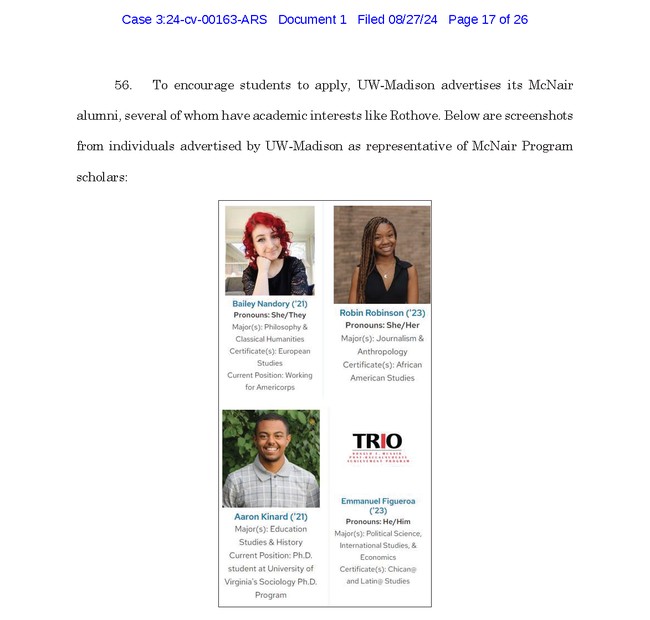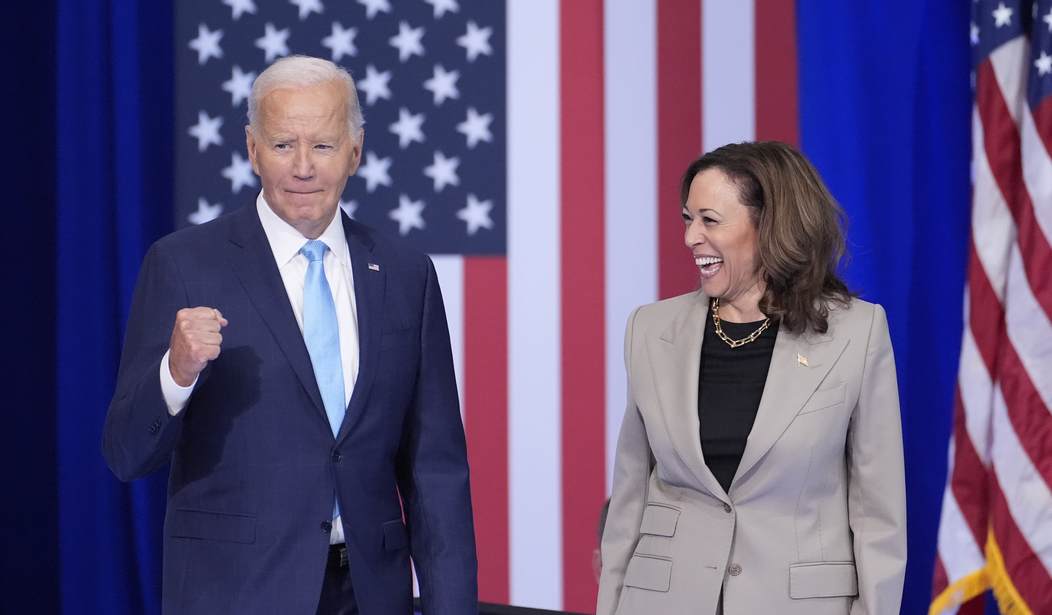The Biden-Harris administration is being sued over an "unconstitutional" and "discriminatory" U.S. Department of Education program that deems certain students "ineligible" to participate due to their race.
Young America's Foundation (YAF), along with the student activist group's local Young Americans for Freedom chapter at the University of North Dakota, filed a federal lawsuit last week against the U.S. Education Department, alleging that its nationwide scholarship and career-advancement program violates the Equal Protection Clause. U.S. Education Department Secretary Miguel Cardona is also named as a defendant.
NEW: @YAF has filed a lawsuit against the U.S. Department of Education and Secretary Cardona for an unconstitutional and racist "achievement program" in which student eligibility is determined by their race — a violation of the equal protection clause. pic.twitter.com/M2zHTPpxvm
— Spencer Brown (@itsSpencerBrown) August 28, 2024
According to a New Guard article written by YAF's communications chief Spencer Brown, the DEI-inspired programming, called the "McNair Post-Baccalaureate Achievement Program," spends over $60 million in taxpayer funds providing financial support and opportunities to approximately 6,000 college students each year who wish to pursue post-graduate education. These benefits that recipients enjoy include internships, seminars, tutoring, academic counseling, research positions, mentoring, and a stipend worth several thousand dollars.
Recommended
As YAF says in the complaint, the "McNair Program excludes many students because of their race" as a result of the Biden-Harris Department of Education and Cardona imposing "mandatory race-based eligibility requirements."
According to the McNair Program's federal regulations, the following groups are considered "ineligible" for such benefits "unless they otherwise qualify as 'low-income first-generation'" college students: Asian, white, Jewish, non-Hispanic Latino, and non-black individuals from Africa.
"Unless they fit into a narrow exception for first-generation low-income students, only those students lucky enough to be on Defendants' list of favored racial groups get a chance to succeed with this program," YAF argues.
The McNair Program’s regulations state that Asian, white, Jewish, non-Hispanic Latino, and non-black individuals from Africa are “ineligible” for benefits “unless they otherwise qualify as ‘low-income first-generation'” students.
— Spencer Brown (@itsSpencerBrown) August 28, 2024
The legal action was brought on behalf of two student plaintiffs who are being racially discriminated against: Avery Durfee and Benjamin Rothove.
Durfee, a student at the University of North Dakota, a member of YAF, and the chairwoman of the UND Young Americans for Freedom chapter, "meets all the requirements for eligibility except one: she is not eligible to apply for the program because she is white," YAF says in the suit.
"I worked hard to get this far in my undergraduate program with a resume fit for graduate school. That is why being told I could not qualify for the McNair program because I am white was difficult to hear," said Durfee, who has not and will not apply so long as the racial requirement remains in effect. "This sends the wrong message to young Americans everywhere."
Rothove, a University of Wisconsin-Madison student and a YAF member, is eligible, too, except he's also white.
"I was excited when I learned about the McNair Program because I thought it would be a great way to help me get into graduate school," Rothove recalled. "But when I realized that I did not qualify because of my race it was devastating," he pivoted. "This is the 21st Century — why are we continuing to separate and divide students?"
 YAF lawsuit | Source: U.S. District Court
YAF lawsuit | Source: U.S. District Court
YAF is arguing that the program should be open to all students, regardless of race. By using "'race as a factor in affording educational opportunities among its citizens,' the McNair Program violates the Constitution's guarantee of equal protection," YAF alleges.
To "remedy this racist policy," Brown explains, YAF is seeking a preliminary and permanent injunction, in addition to a declaratory judgment, that would prohibit the Biden-Harris administration as well as Cardona from enforcing qualification criteria on the basis of race.
"Denying a student the chance to compete for a scholarship based on their skin color is not only discriminatory but also demeaning and unconstitutional," remarked former Wisconsin Gov. Scott Walker, president of YAF. "At YAF, we proudly defend our students' right to be judged on their merit and abilities, not on race."
Wisconsin Institute for Law & Liberty (WILL), a conservative non-profit law firm, is representing the complainants.
WILL's deputy counsel Dan Lennington said this latest legal move continues WILL's "march through Biden-Harris radical DEI programs."
"We have already heard that the Administration knows they can't win in court and so one-by-one we will terminate these discriminatory, taxpayer-funded efforts," Lennington added.
More information and full complaint ⬇️https://t.co/yQjDQGa7kk
— Spencer Brown (@itsSpencerBrown) August 28, 2024
Read the full 26-page filing here.
In 1987, Congress passed the Ronald E. McNair Post-Baccalaureate Achievement Program. The purpose of the program is to racially balance the number of graduate students in America by affording preference to so-called "underrepresented" populations.
In August 2022, while announcing the dispersal of $51.7 million in McNair grants to "improve disadvantaged students' preparation for doctoral study," Nasser Paydar, assistant secretary of the Office of Postsecondary Education, said, "When we look at U.S. students studying to become our future physicians, professors, scientists and other crucial professionals requiring graduate degrees, many demographic groups are underrepresented. McNair grants fund projects at universities and colleges that help underrepresented students to access doctoral programs.”
The U.S. Education Department said the announcement "delivers on Secretary Cardona's priorities to expand equitable access to education and make higher education more inclusive and affordable." 14 "Historically Black College[s] and Universities (HBCUs)" and 55 "Minority Serving Institutions (MSIs)" were among the grantees in that funding cycle.

























Join the conversation as a VIP Member